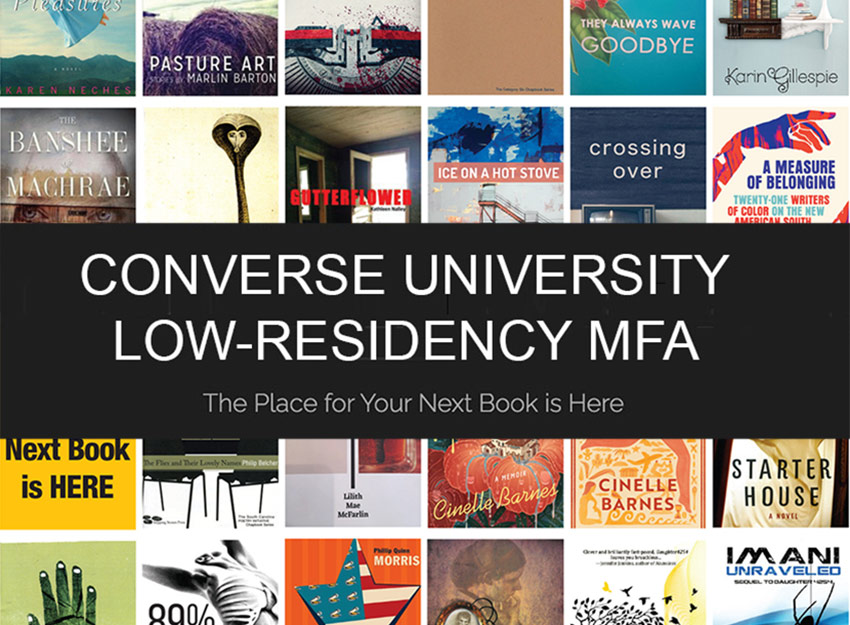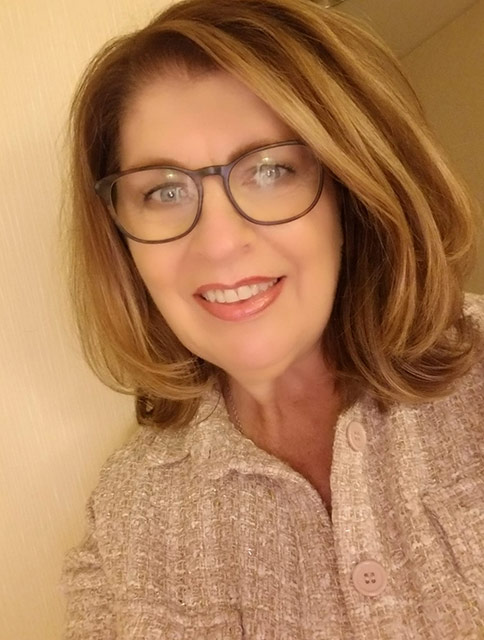In the Wake of Trauma: an MFA Immersion Residency Experience

By Rebecca L. Cleveland Cartwright
Adversarial growth is a psychological phenomenon of post-traumatic changes in which people flourish after extreme adversity. I’d never heard of it until I came across an article comparing some trauma survivors to the lotus. In nature, the lotus seed may lay dormant for hundreds of years in pond muck but still germinate if presented the right conditions. Once growth is activated, the lotus can take up to two years to extend mature tubers, and finally, a bud rises above the murky water line to bloom. Apparently, humans can do the same—rise out of unfortunate circumstances to not only thrive, but to transform into better people.
“Converse University contributed the right environment for me to grow from my adversity.”
Rebecca L. Cleveland Cartwright
I’m not overstating when I say Converse University contributed the right environment for me to grow from my adversity.
I married Tommy in 1981, but before our second anniversary, an accident crushed his back. For the next 36 years, I was his wife and caretaker. But the months between March of 2017 and the summer of 2018 became the most difficult. My father died in March at the same time Tommy began to struggle with more debilitating health problems. He would be in and out of intensive care multiple times by the end of 2017. On January 4th, 2018, our daughter gave birth to her third child, and on January 30th, Tommy died. In February my son-in-law was, with no prior indicators, diagnosed with stage four cancer. He died in June of 2018, leaving two little boys, and a baby who’d never remember him.
I barely survived those months myself, but as a family, we held together.

The mourning interim allowed me time to think about what I wanted that years of caretaking hadn’t allowed. I considered my options while also abiding by the “don’t make any big decisions for the first year after losing a loved one” mantra. As I turned my temporary bedroom back into an office, I found a quote scribbled on a dismembered flap of a manilla envelope: “And the day came when the risk to remain tight in a bud was more painful than the risk it took to blossom” by Anais Nin. I decided my day had come to join the writing world, an idea I’d lodged for years. I needed to do something I enjoyed, so after researching multiple writing programs, I joined the MFA immersion residency at Converse.
Within the first few days of the residency, I called my daughter to tell her I’d found my writing family.
I never expected an immediate connection with like-minded people—writer people. I expected to feel inferior in my lack of writing experience. But that confident writer façade I thought I needed, I didn’t. Everyone was transparent, even the highly-awarded writing mentors and the most academic people on campus.
The bonds cemented my decision to return to Converse for the full MFA program, and my transformation began. I wasn’t fully aware of it until a few months after I graduated from the program in January 2022. The growth I’m referring to isn’t only the increased knowledge of the writing craft and the improvements in my writing, it’s the personal growth I experienced—the adversarial growth.
“The bonds cemented my decision to return to Converse for the full MFA program, and my transformation began.”
Rebecca L. Cleveland Cartwright
Here’s how I think it happened.
Not only did I make connections to the people on campus and continue those relationships, I also connected to fictional characters. I know those pseudo-connections hover on the edge of the parasocial realm—a one-sided encounter or an imagined relationship. But as we engage in fiction, our brains do not distinguish between made-up characters and actual people, so we sometimes experience the same range of emotions as the ones we develop in creating real relationships. Of course, falling into a pathological black hole of celebrity-like obsession is unhealthy. But as benefits, the bonds we build within a fictional character’s “reality” carries us to a deeper understanding of our own, especially since we don’t erect the same kinds of barriers for fictional characters as we tend to do with bonafide humans.
Within those fictional engagements, I analyzed characters such as Gene Forrester in A Separate Peace, Ponyboy Curtis in The Outsiders, Miriam and Laila in A Thousand Splendid Suns, Charlie Gordon in Flowers for Algernon, John Singer in The Heart is a Lonely Hunter, Adah Price in The Poisonwood Bible, and Randle McMurphy in One Flew Over the Cuckoo’s Nest. My thesis included an exploration of the bildungsroman genre, comparing and contrasting Holden Caulfield and Esther Greenwood. I explored their trauma and made connections with my own. A characteristic of the bildungsroman is for the protagonist to undergo a process of alienation, usually by way of a death, in order to achieve self-consciousness.
That’s where I made the most profound changes—in the awareness of myself, something I’d neglected for decades. My writing mentors encouraged me to take risks with my writing, causing me to look inward. Marlin Barton challenged me to write chapters from the perspective of the autistic character in my novel. Those chapters were the most difficult to write but the ones of which I am most proud. At the time, I was moving out of the grips of empathy fatigue—the emotional and physical exhaustion from prolonged care of others. I didn’t know if I could write proper depictions from the perspective of an autistic child, but doing so refilled that empty space.
Bob Olmstead pushed me to strengthen my young female protagonist. In one particular critique of a chapter, he told me to give her a “more active role” in the scene because it was, after all, her story. In another, he said about a passage, “The power should be intrinsic.” I copied those notes in bold letters on the outside of the file folder in which the chapters were filed. They repeated their message from the top of the stack. Even though Bob was relating them to the words on the page, they became personal challenges.
Since then, I’ve recognized my adversarial growth—the transformation that transcends the former state of myself: a heightened sense of gratitude, increased emotional strength and resilience, and the confidence to embrace new opportunities. I can’t undo the trauma, so I’ll bask above the murky pond and enjoy my newfound self.